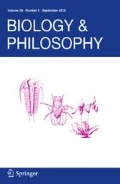Abstract
Ultimately we will only understand biological agency when we have developed a theory of the organization of biological processes, and science is still a long way from attaining that goal. It may be possible nonetheless to develop a list of necessary conditions for the emergence of minimal biological agency. The authors offer a model of molecular autonomous agents which meets the five minimal physical conditions that are necessary (and, we believe, conjointly sufficient) for applying agential language in biology: autocatalytic reproduction; work cycles; boundaries for reproducing individuals; self-propagating work and constraint construction; and choice and action that have evolved to respond to food or poison. When combined with the arguments from preadaptation and multiple realizability, the existence of these agents is sufficient to establish ontological emergence as against what one might call Weinbergian reductionism. Minimal biological agents are emphatically not conscious agents, and accepting their existence does not commit one to any robust theory of human agency. Nor is there anything mystical, dualistic, or non-empirical about the emergence of agency in the biosphere. Hence the emergence of molecular autonomous agents, and indeed ontological emergence in general, is not a negation of or limitation on careful biological study but simply one of its implications.
Similar content being viewed by others
References
Anderson Phil W. (1972) More is Different: Broken Symmetry and the Nature of the Hierarchical Structure of Science. Science 177:393–96
Atkins Peter W. (1984) The Second Law. Scientific American Books, New York
Ashkenasy G., Jagasia R., Yadav M. and Ghadiri M.R. 2004. A self-organized synthetic chemical network, submitted
Bishop John (1983) Agent-Causation. Mind N.S. 92:61–79
Broad C.D. (1925) The Mind and Its Place in Nature. Routledge & Kegan Paul, London
Chisholm Roderick M. (1976) The Agent as Cause. In: Myles Brand and Douglas Walton (eds) Action Theory. D. Reidel, Dordrecht
Clayton Philip (2004) Mind and Emergence: From Quantum to Consciousness. Oxford University Press, Oxford
Daley A.J., Girvin A., Kauffman S.A., Wills P.R., Yamins D. (2002) Simulation of Chemical Autonomous Agents. Z. Phys. Chem. 216:41–49
Emmeche Claus, Kull Kalevi, Stjernfelt Frederik (2002) Reading Hoffmeyer, Rethinking Biology. Tartu University Press, Tartu, Estonia
Heil John (2003) Multiply Realized Properties. In: Sven Walter, Heinz-Dieter Heckmann (eds) Physicalism and Mental Causation: The Metaphysics of Mind and Action. Imprint Academic, Exeter
Hoffmeyer Jesper (1996) Signs of Meaning in the Universe, trans. Barbara J. Haveland, Indiana University Press, Bloomington
Kant Immanuel (1987) Critique of Judgment, trans. Werner S. Pluhar, Hackett, Indianapolis
Kauffman Stuart (1993) Origins of Order: Self-Organization and Selection in Evolution. Oxford University Press, New York
Kauffman Stuart (1996) At Home in the Universe: The Search for Laws of Self-Organization and Complexity. Oxford University Press, New York
Kauffman Stuart (2000) Investigations. Oxford University Press, New York
Lee D.H., Granja J.R., Martinez J.A., Severikn K., Ghadiri M.R. (1996) A Self-Replicating Peptide. Nature 382:525–528
Laughlin Robert (2005) A Different Universe: Reinventing Physics from the Bottom Down. Basic Books, New York
McLaughlin Brian (1992) The Rise and Fall of British Emergentism. In: Beckerman A., Hans Flohr, Jaegwon Kim (eds) Emergence or Reduction? Essays on the Prospects of Nonreductive Physicalism. Walter de Gruyter, New York
Monod Jacques (1971) Chance and Necessity: An Essay on the Natural Philosophy of Modern Biology, trans. Austryn Wainhouse, Knopf, New York
O’Connor Timothy (ed) (1995) Agents, Causes, and Events: Essays on Indeterminism and Free Will. Oxford University Press, New York
Taborsky Edwina (ed) (1999) Semiosis, Evolution, Energy: Towards a Reconceptualization of the Sign. Shaker Verlag, Aachen, Germany
Weber Andreas (2003) Natur als Bedeutung: Versuch einer semiotischen Theorie des Lebendigen. Königshausen & Neumann, Würzburg, Germany
Weinberg Steven (1992) Dreams of a Final Theory. Pantheon, New York
Wimsatt William C. (1994) The Ontology of Complex Systems: Levels of Organization, Perspectives, and Causal Thickets. Canadian Journal of Philosophy, Supplementary 20:207–74
von Wright Georg Henrik (1971) Explanation and Understanding. Cornell University Press, Ithaca
Author information
Authors and Affiliations
Corresponding author
Rights and permissions
About this article
Cite this article
Kauffman, S., Clayton, P. On emergence, agency, and organization. Biol Philos 21, 501–521 (2006). https://doi.org/10.1007/s10539-005-9003-9
Received:
Accepted:
Published:
Issue Date:
DOI: https://doi.org/10.1007/s10539-005-9003-9



